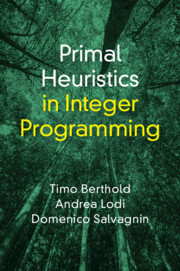
-
Select format
-
- Publisher:
- Cambridge University Press
- Publication date:
- 04 April 2025
- 03 April 2025
- ISBN:
- 9781009574792
- 9781009574785
- 9781009574808
- Dimensions:
- (229 x 152 mm)
- Weight & Pages:
- 0.347kg, 139 Pages
- Dimensions:
- (229 x 152 mm)
- Weight & Pages:
- 0.226kg, 139 Pages
You may already have access via personal or institutional login
Book description
Primal heuristics guarantee that feasible, high-quality solutions are provided at an early stage of the solving process, and thus are essential to the success of mixed-integer programming (MIP). By helping prove optimality faster, they allow MIP technology to extend to a wide variety of applications in discrete optimization. This first comprehensive guide to the development and use of primal heuristics within MIP technology and solvers is ideal for computational mathematics graduate students and industry practitioners. Through a unified viewpoint, it gives a unique perspective on how state-of-the-art results are integrated within the branch-and-bound approach at the core of the MIP technology. It accomplishes this by highlighting all the required knowledge needed to push the heuristic side of MIP solvers to their limit and pointing out what is left to do to improve them, thus presenting heuristic approaches for MIP as part of the MIP solving process.
Reviews
‘Primal Heuristics in Integer Programming by Timo Berthold, Andrea Lodi, and Domenico Salvagnin is a groundbreaking work that offers deep insights and practical approaches to design sound heuristics for integer programming. This book will be an invaluable resource for both researchers and practitioners in the field. I will highly recommend the book to anyone looking to deepen their understanding of this crucial area.’
Matteo Fischetti - University of Padua, Italy
‘Primal Heuristics in Integer Programming is a singular work in the area of computational integer optimization. It aggregates many of the most important techniques that state-of-the-art solvers use for actually producing high-quality solutions to large-scale and/or difficult mixed-integer linear optimization problems. This book fills a big gap left by the many textbooks on mixed-integer linear optimization problems. Certainly it should be on the shelf of any student, researcher or practitioner who wants a complete picture of how such solvers work.’
Jon Lee - University of Michigan
Contents
Metrics
Altmetric attention score
Full text views
Full text views help Loading metrics...
Loading metrics...
* Views captured on Cambridge Core between #date#. This data will be updated every 24 hours.
Usage data cannot currently be displayed.
Accessibility standard: Unknown
Why this information is here
This section outlines the accessibility features of this content - including support for screen readers, full keyboard navigation and high-contrast display options. This may not be relevant for you.
Accessibility Information
Accessibility compliance for the PDF of this book is currently unknown and may be updated in the future.


